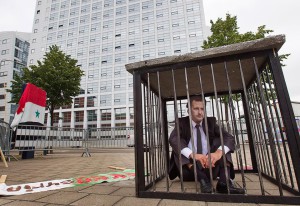 FRENCH INQUIRY INTO SYRIA WAR CRIMES SHOULD INCLUDE IRANIAN AND HEZBOLLAH ROLE
FRENCH INQUIRY INTO SYRIA WAR CRIMES SHOULD INCLUDE IRANIAN AND HEZBOLLAH ROLE
Scope of investigation should be widened to include chemical attacks, barrel bombs and sectarian cleansing
The Hague, 5 October 2015 – The campaign group Naame Shaam (1) today welcomed the preliminary inquiry opened by prosecutors in Paris into unlawful detention, torture and executions committed by the regime of Syrian President Bashar al-Assad.
However, the groups said the focus of the investigation, which started last week, is too narrow and should be widened to include other war crimes and crimes against humanity committed in Syria, as well as the role played in these crimes by the Iranian occupation forces in Syria and the sectarian militias they control there, such as Hezbollah Lebanon as well as Iraqi and Afghan militiamen.
The head of Naame Shaam’s Research and Advocacy team, Shiar Youssef, said: “While we welcome the French initiative to investigate war crimes and crimes against humanity committed by Bashar’s al-Assad regime, particularly in light of the deadlock facing the International Criminal Court (ICC) due to Russian vetos in the UN Security Council, we believe the investigation is too narrow in its focus. Such an inquiry should include other war crimes and crimes against humanity committed in Syria, such as sectarian cleansing and the indiscriminate attacks on civilians using chemical weapons and barrel bombs.”
“We also appeal to the French prosecutors to look into the role played by Iranian commanders in these crimes. Sepah Qods, the foreign arm of Sepah Pasdaran, or Iran’s Revolutionary Guards, has been in effective control of the Syrian regime’s military strategy and tactics since mid-2013. Criminal responsibility for international crimes includes command or superior responsibility, both de jure and de facto, according to the Rome Statute and various international criminal tribunals,” Youssef added.
“The role of the militias controlled by Sepah Qods in Syria, such as Hezbollah Lebanon and the Afghan Shia militiamen of the Fatimiyun Brigade, should also be investigated. It is their role that has allowed, and continues to allow, these horrific crimes to take place in Syria,” he said
The French investigation, with has the backing of the French Foreign Ministry, is reportedly based primarily on evidence from the former Syrian army photographer known as “Caesar”.(2) It is therefore expected to focus primarily on unlawful detention, torture and executions committed by Syrian regime forces.
Last May, Naame Shaam published an in-depth report entitled “Silent Sectarian Cleansing: Iranian Role in Mass Demolitions and Population Transfers in Syria.”(3) The report focuses on the role of Iran’s Sepah Qods in two specific war crimes and crimes against humanity committed repeatedly in certain parts of Syria since the start of the Syrian revolution in March 2011: the unlawful destruction and appropriation of civilian property and the forcible displacement and transfer of civilian population.
The ultimate aim of this state policy of sectarian cleansing, which has mainly targeted the Muslim Sunni population in certain parts of Syria, is to secure the Damascus–Homs–Coast corridor along the Lebanese border in order to both provide a geographical and demographic continuity of regime-held areas and secure arms shipments to Hezbollah in Lebanon, which can only be transported via Syria since the Hezbollah-Israel war in summer 2006.(4)
Naame Shaam’s Campaign Director, Fouad Hamdan, said: “The current Russian military involvement in Syria is mainly aimed at helping the Iranian forces and their sectarian militias secure the Damascus–Homs–Coast corridor and the coastal areas. In other words, it aims to consolidate the Iranian-Russian occupation of these areas of Syria.”
“Like his Iranian counterparts, Russian President Vladimir Putin is now co-responsible for the war crimes and crimes against humanity committed by the forces and militias fighting on behalf of Bashar al-Assad,” Hamdan added. “This means Putin, too, may one day be investigated for such crimes, because his warplanes are basically providing a cover for al-Assad’s, Iran’s and Hezbollah’s forces on the ground.”
Naame Shaam has been demanding that the UN Security Council refers the situation in Syria to the International Criminal Court (ICC). All war crimes and crimes against humanity committed in Syria should be investigated and their perpetrators punished according to international law. And this should include the role played by Sepah Qods and the militias it controls in Syria, such as Hezbollah Lebanon.(5)
Notes for editors:
1. Naame Shaam is a group of secular Iranian, Syrian and Lebanese activists and citizen-journalists that focuses on uncovering the role of the Iranian regime in Syria. Naame Shaam (نامه شام) means “Letter from Syria” in Persian. More: www.naameshaam.org.
2. More about former Syrian army photographer “Caesar”, see here and here.
3. See the Naame Shaam report “Silent Sectarian Cleansing: Iranian Role in Mass Demolitions and Population Transfers in Syria” (May 2015).
Naame Shaam produced another in-depth report on the role of the Iranian regime in Syria, entitled “Syria in Iran – From an Ally of the Regime to an occupying Force” (November 2014). It provides numerous examples and case studies of human rights violations, war crimes and crimes against humanity committed in Syria by Iranian-controlled forces. It also highlights ways of bringing possible lawsuits against Iranian regime officials, such as Gen. Qassem Soleimani, the head of Sepah Qods.
4. Following the Hezbollah-Israel war in the summer of 2006, marine vessels under a UN mandate have been preventing Iranian arms reaching Hezbollah via Lebanese ports, in line with UN Security Council resolution 1701 of 11 August 2006. Since then, the Iranian regime has been shipping arms and ammunition to Hezbollah Lebanon via Syrian ports. From there they are illegally transported into Lebanon. Syria has been the lifeline of Iran’s army in Lebanon, i.e. Hezbollah, since end 2006.
5. For more on this, see here.
 English
English  فارسی
فارسی  العربية
العربية 




 On Twitter
On Twitter